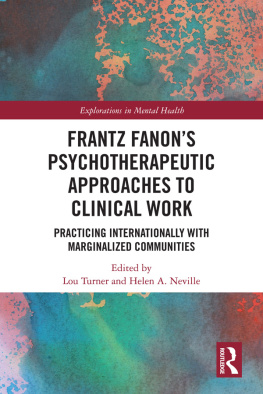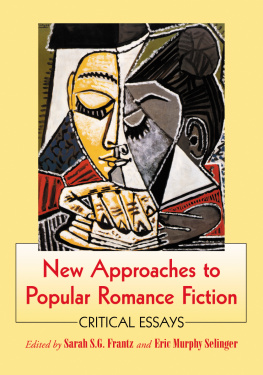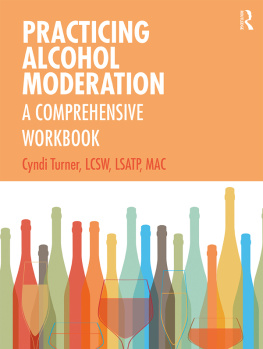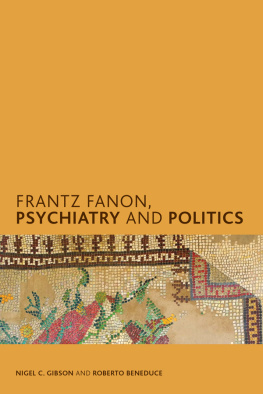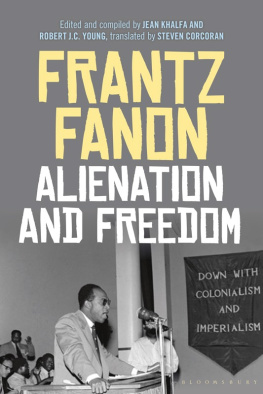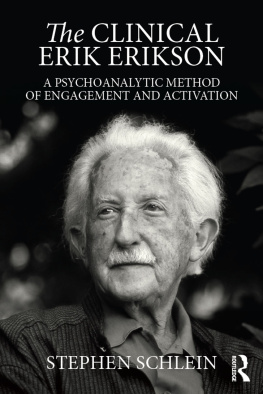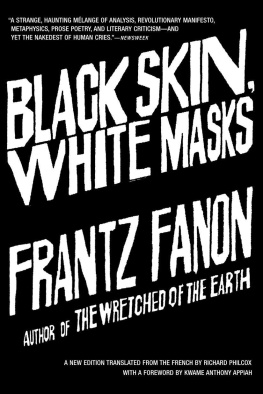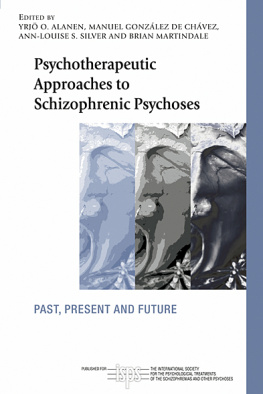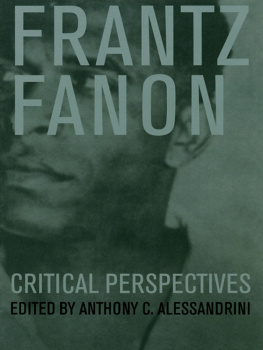Lou Turner - Frantz Fanons Psychotherapeutic Approaches to Clinical Work: Practicing Internationally with Marginalized Communities
Here you can read online Lou Turner - Frantz Fanons Psychotherapeutic Approaches to Clinical Work: Practicing Internationally with Marginalized Communities full text of the book (entire story) in english for free. Download pdf and epub, get meaning, cover and reviews about this ebook. year: 2019, publisher: Taylor & Francis (CAM), genre: Romance novel. Description of the work, (preface) as well as reviews are available. Best literature library LitArk.com created for fans of good reading and offers a wide selection of genres:
Romance novel
Science fiction
Adventure
Detective
Science
History
Home and family
Prose
Art
Politics
Computer
Non-fiction
Religion
Business
Children
Humor
Choose a favorite category and find really read worthwhile books. Enjoy immersion in the world of imagination, feel the emotions of the characters or learn something new for yourself, make an fascinating discovery.
- Book:Frantz Fanons Psychotherapeutic Approaches to Clinical Work: Practicing Internationally with Marginalized Communities
- Author:
- Publisher:Taylor & Francis (CAM)
- Genre:
- Year:2019
- Rating:4 / 5
- Favourites:Add to favourites
- Your mark:
- 80
- 1
- 2
- 3
- 4
- 5
Frantz Fanons Psychotherapeutic Approaches to Clinical Work: Practicing Internationally with Marginalized Communities: summary, description and annotation
We offer to read an annotation, description, summary or preface (depends on what the author of the book "Frantz Fanons Psychotherapeutic Approaches to Clinical Work: Practicing Internationally with Marginalized Communities" wrote himself). If you haven't found the necessary information about the book — write in the comments, we will try to find it.
Lou Turner: author's other books
Who wrote Frantz Fanons Psychotherapeutic Approaches to Clinical Work: Practicing Internationally with Marginalized Communities? Find out the surname, the name of the author of the book and a list of all author's works by series.
Frantz Fanons Psychotherapeutic Approaches to Clinical Work: Practicing Internationally with Marginalized Communities — read online for free the complete book (whole text) full work
Below is the text of the book, divided by pages. System saving the place of the last page read, allows you to conveniently read the book "Frantz Fanons Psychotherapeutic Approaches to Clinical Work: Practicing Internationally with Marginalized Communities" online for free, without having to search again every time where you left off. Put a bookmark, and you can go to the page where you finished reading at any time.
Font size:
Interval:
Bookmark:

Frantz Fanon, Institutional Psychotherapy, and the Decolonization of Psychiatry
Camille Robcis
In December 1956, Frantz Fanon resigned from his position as medical director of the psychiatric hospital of Blida-Joinville in Algeria. In a letter addressed to the Resident Minister and Governor General Robert Lacoste, Fanon (1967) explained that after three years of arduous work to improve the mental health of the local population, the reality of colonialism, its tissue of lies, cowardice, [and] contempt for man had finally convinced him to leave:
Madness is one of the means man has of losing his freedom. And I can say, on the basis of what I have been able to observe from this point of vantage, that the degree of alienation of the inhabitants of this country appears to me frightening. If psychiatry is the medical technique that aims to enable man no longer to be a stranger to his environment, I owe it to myself to affirm that the Arab, permanently alien [ alin permanent ] in his own country, lives in a state of absolute depersonalization.
(p. 53)
By choosing the adjective alin to describe the colonized Algerians, Fanon was playing with the double meaning of the term in French: estranged and foreigneven in their own landbut also mentally unstable, crazy, insane. More broadly, Fanon was articulating a point that he reiterated throughout his life: colonialism had a direct psychic effect. It could literally render someone mad by hijacking their person, their being, and their sense of self. The confiscation of freedom and the alienation brought about by colonialism and by racism were always political and psychic at once.
By the time Fanon wrote this letter in 1956, the war in Algeria had turned increasingly violent. Guy Mollet, the new prime minister elected earlier that year, was greeted by tomatoes and furious crowds in Algiers in February 1956. The following month, the French legislature voted to grant the government special powers, giving the army free reign to reestablish order in Algeria. Fanon had followed the intensification of the war closely and by 1956, he was already involved with the Front de Libration Nationale (FLN) which had reached out to him in his capacity as a doctor to provide drugs and medical adviceincluding psychiatric helpfor the combatants. As Fanon (1967) explained in his letter to Lacoste, he had finally come to realize that his absurd gamble to promote progressive psychiatric reforms while serving the French State was hopeless. As he put it, it had become increasingly obvious that the social structure existing in Algeria was hostile to any attempt to put the individual back to where he belonged. The events in Algeria are the logical consequence of an abortive attempt to decerebralize a people (p. 53). Violence, in other words,political, social, and psychicwas constitutive of colonialism: it was the structure of the land, a structure that had come to condition individuals in their very psyche.
Fanons letter gives us a particularly good entry-point into his conception of the psychiatric which is the subject of this essay. More precisely, I wish to highlight two of the hypotheses that Fanon formulates in his letter: first, that the political and the psychic are intimately tied; and second, that the social space and the physical environment of the colony, the enclosure and the segregation on which they are premised, fundamentally shape the psyche of the colonized. Fanon had intuited these theses from his most early work, especially in Black Skin, White Masks and The North African Syndrome, both published in 1952. However, as I wish to argue here, it was his residency at the hospital of Saint-Alban from 1952 to 1953, his encounter with Franois Tosquelles, and his discovery of institutional psychotherapy that ultimately confirmed for him, on an empirical level, that alienation was always social and psychic at once.
Institutional psychotherapy played a key role in Fanons thought and medical practice not only by giving him the tools to diagnose what Tosquelles called the concentrationist logic of asylums (but also, as Fanon would suggest, of the colonial world). It also offered Fanon an example of what dis-alienation, freedom, and emancipation could look like within the hospital and also within society at large. After leaving Saint-Alban, Fanon tried to enact these experiments inspired by institutional psychotherapy, both in his clinical work in Algeria and Tunisia and in his political writings. As I want to show, Fanon neither applied nor adapted a model of Western psychiatry to the colonial settings of Algeria and Tunisia. Rather, he revised the very foundations of this framework in order to promote what he considered a truly disalienated and disalienating psychiatry, a psychiatry close to the notion of national culture that Fanon theorized in his last and best-known book, The Wretched of the Earth .
To be sure, the fact that Fanon practiced psychiatry throughout his life is not new (Bulhan, 1985; Cherki, 2000; Keller, 2007a; Khalfa, 2015; Macey, 2012; Mbembe, 2016; Ranzanajao & Postel, 2007; Vergs, 1997). My aim in this chapter is thus not to underscore once again the importance of psychiatry in Fanons work. Rather, I want to argue that the evolution of Fanons thought across institutional and political/decolonial contexts explains as much about the history, promise, and achievements of institutional psychotherapy as it does about his political thinking. My point is to highlight the significance of Fanon in the genealogy of what is generally called Western radical psychiatry.
Fanon left his native island of Martinique to study medicine in Lyon in 1946. He chose to specialize in psychiatry in 1949 under the supervision of Jean Dechaume, an expert in psychosurgery, neuropsychiatry, and neurology. At the time, French university training in the domain of psychiatry was dominated by an organicist and neuropsychiatric approach to mental illness, and this was especially true of Lyon. Fanon admired Dechaumes scientific rigor and he retained a certain inclination for this type of empiricism throughout his life. However, he quickly felt constrained by the theoretical narrowness of psychiatry and turned to other fields, including literature, anthropology, philosophy, and psychoanalysis. While at Lyon, he attended the lectures of the anthropologist Andr Leroi-Gourhan and of the philosopher Maurice Merleau-Ponty. He read extensively and engaged the main intellectuals of his period: Claude Lvi-Strauss, Marcel Mauss, Karl Marx, Vladimir Lenin, G.W.F. Hegel (mediated by Alexandre Kojve and Jean Hyppolite), Martin Heidegger, and Jean-Paul Sartre. During these years, Fanon also immersed himself in psychoanalysis through Freud and Lacan, and in Gestalt theory through Kurt Goldstein. Finally, he wrestled with the theses of Henri Ey and other French psychiatrists gathered around the journal volution Psychiatrique who had been trying to reconcile psychiatry and psychoanalysis since 1925. From existentialism and anthropology, Fanon learned the importance of relationality in the construction of the self. Through Marxism, he came to appreciate the decisive effect of politics on the human condition. Psychoanalysis and phenomenology offered him a theory of embodiment that complemented social construction. Bringing together these different currents and disciplines, Fanon spent much of his time in medical school thinking about psychic causation, trying to untangle the biological from the psychological, and separating the role of phylogeny, ontogeny, and sociogeny in the constitution of the self.
Fanons medical thesis centered on Friedreichs ataxia, a hereditary disease that causes progressive damage to the nervous system. As he explained in his introduction (2018), this illness was of particular interest to him because despite the fact that the state of general paralysis was eminently neurological, it was usually accompanied by a certain psychiatric symptom cluster (p. 206). The close study of Friedreichs ataxia was thus for Fanon a way to ponder a fundamental medicalbut also philosophicalquandary: At what point can a neurological disease be suspected of triggering psychic alterations? At what point can it be said that the thought processes are disturbed? (p. 224). This was another way to delimit neurology and psychiatry, to reflect on the problem of specialization and disciplinary borders (p. 247). In order to think through these questions, Fanon turned to the works of Henri Ey, Jacques Lacan, and Kurt Goldsteinthree of his contemporaries who were also crucial for the doctors at Saint-Alban. In his thesis, Fanon mapped out the substantial differences between their respective approaches before suggesting that the three figures were linked by their desire to undercut the dichotomy between the neurological and the physiological. Ey, Fanon wrote, remained committed to a neurological framework despite the fact that he underscored the psychic nature of pathogenesis (p. 255). For Goldstein, every organic manifestation is the fruit of global mechanisms. For him, the organism acts as a whole (p. 255). In both cases, Fanon observed, neurological and psychiatric troubles went hand-in-hand.
Next pageFont size:
Interval:
Bookmark:
Similar books «Frantz Fanons Psychotherapeutic Approaches to Clinical Work: Practicing Internationally with Marginalized Communities»
Look at similar books to Frantz Fanons Psychotherapeutic Approaches to Clinical Work: Practicing Internationally with Marginalized Communities. We have selected literature similar in name and meaning in the hope of providing readers with more options to find new, interesting, not yet read works.
Discussion, reviews of the book Frantz Fanons Psychotherapeutic Approaches to Clinical Work: Practicing Internationally with Marginalized Communities and just readers' own opinions. Leave your comments, write what you think about the work, its meaning or the main characters. Specify what exactly you liked and what you didn't like, and why you think so.

